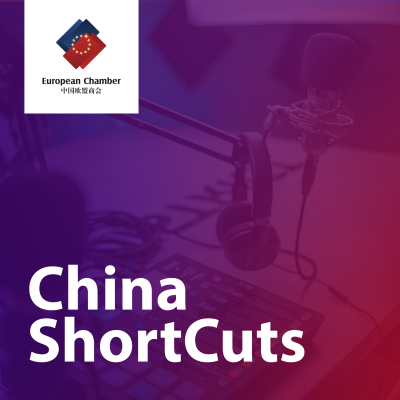
China ShortCuts
Podcast af The European Union Chamber of Commerce in China
Begrænset tilbud
1 måned kun 9 kr.
Derefter 99 kr. / månedIngen binding.

Mere end 1 million lyttere
Du vil elske Podimo, og du er ikke alene
Rated 4.7 in the App Store
Læs mere China ShortCuts
European Chamber’s China ShortCuts is a five-minute weekly catch-up about the Chinese business landscape. Tune in every Wednesday for the latest economic data, market trends, and policy and regulatory updates.
Alle episoder
50 episoderThis episode contains segments on: * July Consumer and Producer Price Indices; * US and China extended tariff pause; * July foreign trade data; and * Implementation guidelines for Private Economy Promotion Law. European Chamber’s 9th Sustainable Business Awards are open for applications until 14th September. Join the online information session on 28th August to learn more. Contact: We’d love to hear your feedback. Contact us at website@europeanchamber.com.cn. Follow the European Chamber on LinkedIn, Twitter, WeChat (europeanchamber), and sign up for our newsletter here, to get notified on new episodes. Read more: CPI and PPI https://www.stats.gov.cn/sj/zxfbhjd/202508/t20250809_1960634.html [https://www.stats.gov.cn/sj/zxfbhjd/202508/t20250809_1960634.html] https://www.stats.gov.cn/sj/zxfbhjd/202508/t20250809_1960635.html [https://www.stats.gov.cn/sj/zxfbhjd/202508/t20250809_1960635.html] https://www.stats.gov.cn/sj/zxfbhjd/202508/t20250809_1960633.html [https://www.stats.gov.cn/sj/zxfbhjd/202508/t20250809_1960633.html] US-China tariffs https://www.whitehouse.gov/presidential-actions/2025/08/further-modifying-reciprocal-tariff-rates-to-reflect-ongoing-discussions-with-the-peoples-republic-of-china/ [https://www.whitehouse.gov/presidential-actions/2025/08/further-modifying-reciprocal-tariff-rates-to-reflect-ongoing-discussions-with-the-peoples-republic-of-china/] https://www.whitehouse.gov/fact-sheets/2025/08/fact-sheet-president-donald-j-trump-continues-the-suspension-of-the-heightened-tariffs-on-china/ [https://www.whitehouse.gov/fact-sheets/2025/08/fact-sheet-president-donald-j-trump-continues-the-suspension-of-the-heightened-tariffs-on-china/] https://www.news.cn/20250812/51f8bbe50ab84e1ab1707fa1caeedff6/c.html [https://www.news.cn/20250812/51f8bbe50ab84e1ab1707fa1caeedff6/c.html] https://www.gov.cn/zhengce/zhengceku/202508/content_7036104.htm [https://www.gov.cn/zhengce/zhengceku/202508/content_7036104.htm] Foreign trade data http://www.customs.gov.cn/customs/302249/zfxxgk/2799825/302274/302275/6661554/index.html [http://www.customs.gov.cn/customs/302249/zfxxgk/2799825/302274/302275/6661554/index.html] http://www.customs.gov.cn/customs/302249/zfxxgk/2799825/302274/302275/6661684/index.html [http://www.customs.gov.cn/customs/302249/zfxxgk/2799825/302274/302275/6661684/index.html] Law on Promoting the Private Economy implementation guidelines https://www.court.gov.cn/zixun/xiangqing/473191.html [https://www.court.gov.cn/zixun/xiangqing/473191.html] Sustainable Business Awards Information Session https://www.europeanchamber.com.cn/en/upcoming-events/28130 [https://www.europeanchamber.com.cn/en/upcoming-events/28130] Transcript: RUI: Hello and welcome to China ShortCuts, MARIANN: the European Chamber’s weekly catchup on China’s business landscape. RUI: This episode was recorded on 13th August 2025. (MUSIC) RUI: Data on July consumer and producer prices, released on 9th August by the National Bureau of Statistics, further fuelled concerns over the negative economic impact that persistent deflation is having on China’s economy. MARIANN: July’s consumer price index indicated no change year-on-year, while the producer price index posted a 3.6 per cent year-on-year decline. The latter marks the 34th consecutive month of year-on-year decreases in producer prices, furthering concerns about deflation. While an official interpretation of the data suggested that this was due to seasonal factors and international trade uncertainty, the former would not explain the significant year-on-year decline. The data suggests that government measures to reduce overcapacity and reign in unfair competition have not yet translated into measurable results for the Chinese economy. (MUSIC) RUI: On 11th August US President Donald Trump signed a last-minute executive order extending the suspension of “heightened tariffs” on Chinese goods for an additional 90 days. China announced an extension of its suspension of additional tariffs on US goods shortly after. MARIANN: The move—which comes just before the 90-day tariff pause was set to expire—follows US-China trade talks that took place in Stockholm last month. The negotiations ended with mixed messaging, with the Chinese side suggesting that an agreement to extend the pause had been reached while the US side insisted that nothing could be agreed without Donald Trump’s approval. Monday’s executive order and the resulting Chinese announcement mean that the current 10 per cent reciprocal tariff rate will stay in place until 10th November. Additional tariffs, including the US’s 20 per cent tariff intended to punish China for its alleged involvement in the export of fentanyl and fentanyl precursor chemicals to the US, as well as tariffs on some goods that were in place before Donald Trump’s second term started this January, will continue to apply above the baseline 10 per cent. In addition, China will continue the suspension of some non-tariff measures, including some export controls. While the extended pause indicates a lack of appetite from both sides to return to the high tariff levels seen in April, the 90-day timeframe does not provide businesses with enough certainty to make long-term plans. (MUSIC) RUI: On 7th August the General Administration of Customs released China’s foreign trade data for July, recording growth in both exports and imports. MARIANN: Exports grew at the highest year-on-year rate since April at 7.2 per cent, while imports jumped to the highest year-on-year level since July 2024 at 4.1 per cent. The growth came during the last full month of the first 90-day tariff pause between the United States and China, which was set to end on 12th August prior to the last-minute extension. The July trade data represents purchasing decisions made early in the tariff pause, if not before. Given the uncertainty about whether the pause would be extended, many businesses seem to have frontloaded exports in anticipation of tariff levels rising after 12th August. (MUSIC) RUI: On 8th August, China’s Supreme Court issued the implementation guidelines for the Law on Promoting the Private Economy, further clarifying how the new law should be implemented by courts. MARIANN: China’s Law on Promoting the Private Economy came into effect on 20th May 2025, and is designed to provide greater legal protections for private businesses. While neither the law nor its implementing guidelines introduce any major reforms, they do aim to ensure that the existing rights of private businesses are better protected. The guidelines include specific provisions for courts to handle disputes between private businesses and local governments, with the intention to clamp down on a variety of behaviours that hurt the business environment. It remains to be seen how effective the law will be, given that, in many cases, private businesses will have to take cases against local governments to court—which would potentially damage their relationships with important stakeholders—before they could expect to see a resolution. (MUSIC) RUI: This year, the European Chamber will host the 9th Sustainable Business Awards, designed to advance sustainability awareness and promote responsible business models. MARIANN: This year’s awards include 11 unique categories, covering a variety of areas like leadership, supply chain development and talent empowerment. Companies can nominate themselves until 14th September by filling out an application form available on the Chamber’s website. RUI: To learn more, join us for an online information session on 28th August during which further details about the application process will be shared. (MUSIC) MARIANN: Thanks for listening, and don’t forget to tune in again next week. RUI: In the meantime, please find useful links in the episode notes.
This episode contains segments on: * China July Purchasing Managers’ Indices (PMI); * Consumer goods trade-in programme in the fourth quarter; * Politburo meeting on economic work priorities; and * Compliance guidelines for fee collection by online platforms. The Chamber is revisiting a quarter century of advocacy in China through the EU-China Business Chronicle Series. Contact: We’d love to hear your feedback. Contact us at website@europeanchamber.com.cn. Follow the European Chamber on LinkedIn, Twitter, WeChat (europeanchamber), and sign up for our newsletter here, to get notified on new episodes. Read more: Official July manufacturing and non-manufacturing PMI (NBS) https://www.stats.gov.cn/sj/zxfb/202507/t20250731_1960551.html [https://www.stats.gov.cn/sj/zxfb/202507/t20250731_1960551.html] S&P Global China General Manufacturing and Services PMI https://www.pmi.spglobal.com/Public/Home/PressRelease/7e7d7a1b6a374fdbafc02a0bda3c9f3b [https://www.pmi.spglobal.com/Public/Home/PressRelease/7e7d7a1b6a374fdbafc02a0bda3c9f3b] https://www.pmi.spglobal.com/Public/Home/PressRelease/37b333939459450d842df110bbc7496a [https://www.pmi.spglobal.com/Public/Home/PressRelease/37b333939459450d842df110bbc7496a] Consumer goods trade-in programme https://www.gov.cn/lianbo/bumen/202508/content_7034862.htm [https://www.gov.cn/lianbo/bumen/202508/content_7034862.htm] https://english.www.gov.cn/news/202508/01/content_WS688c5330c6d0868f4e8f49a4.html [https://english.www.gov.cn/news/202508/01/content_WS688c5330c6d0868f4e8f49a4.html] Politburo meeting http://www.news.cn/politics/leaders/20250730/e41e27baa42543969bb27e4f7187e848/c.html [http://www.news.cn/politics/leaders/20250730/e41e27baa42543969bb27e4f7187e848/c.html] Online platform fees https://www.samr.gov.cn/zw/zfxxgk/fdzdgknr/jjjzs/art/2025/art_e4eca064b20843c6a97ead0c94fda00e.html [https://www.samr.gov.cn/zw/zfxxgk/fdzdgknr/jjjzs/art/2025/art_e4eca064b20843c6a97ead0c94fda00e.html] Transcript: RUI: Hello and welcome to China ShortCuts, MARIANN: the European Chamber’s weekly catchup on China’s business landscape. RUI: This episode was recorded on 6th August 2025. (MUSIC) RUI: Data released by the National Bureau of Statistics at the end of last month showed that manufacturing activity in China went into a fourth consecutive month of contraction in July. At the same time, growth in the non-manufacturing sector—comprising services and construction—decelerated to the slowest level since last November. MARIANN: The official manufacturing purchasing managers’ index, or PMI, stood at 49.3 points in July – the lowest level recorded since April. Readings below 50 points indicate contraction. The decline in overall activity was propelled by a sharp drop in new orders, with demand slipping back into contraction territory after a brief expansion in May. A persistent fall in export orders continued and even accelerated during the past month. The non-manufacturing PMI stood at 50.1 points, as growth in construction activity slowed and services activity stagnated in July amid declining demand. (MUSIC) RUI: Private surveys conducted by S&P Global—formerly in collaboration with Caixin—showed a similar picture of China’s manufacturing activity, with the S&P Global China General Manufacturing PMI dropping to 49.5 points in July. Service sector activity fared better, expanding at the fastest pace since May. MARIANN: Much as the official PMI data did, S&P Global’s findings also linked the drop in manufacturing activity to a slowdown in growth of new orders, which was shown to result in a scaling back of production. Services PMI, meanwhile, came in at 52.6 points for July, up from the previous month. The expansion in July marks over two and a half years of continuous growth in services activity. Service prices rose for the first time since January and services firms expanded their workforce, according to data from S&P. The expansion comes on the back of a recovery in export volumes amid a lull in US-China trade tensions. Although service providers do not directly produce tariffed products, they often have goods-sector clients that do. (MUSIC) RUI: On 1st August, the National Development and Reform Commission confirmed that an additional 69 billion Chinese yuan in funds for China’s consumer goods trade-in programme would be released for the fourth quarter of the year. MARIANN: This will complete the 300 billion Chinese yuan in funding from special treasury bonds that was allocated for local governments to implement the trade-in programme throughout 2025. The programme—which subsidises a range of consumer goods, including cars and home appliances—is intended to boost household consumption amidst the ongoing economic slowdown. While policymakers have been conservative with the use of direct-to-consumer subsidies, the trade-in programme—which is intended to help consumers replace outdated and inefficient technology—is an exception. According to the European Chamber’s Business Confidence Survey 2025, China’s economic slowdown remains the top challenge to members’ future business, with the need to boost domestic demand now a high advocacy priority. (MUSIC) RUI: On 30th July, the Political Bureau of the Communist Party of China Central Committee held a meeting focused on the country’s economic situation and discussed work priorities for the second half of the year. MARIANN: The meeting readout includes calls to “regulate disorderly competition” and “promote capacity management in key industries”. Unhealthy competition in some sectors has led to a situation in which companies invest ever increasing resources without generating commensurate returns, a phenomenon sometimes referred to as ‘disorderly competition’ or ‘involution’. Regulating ‘disorderly competition’, as well as overcapacity—two problems that are interlinked—will likely continue to be a priority for policymakers for the rest of the year. During the meeting, it was also confirmed that the fourth plenum—during which the 15th Five-year Plan will be discussed—will take place in October. (MUSIC) RUI: On 2nd August, the State Administration for Market Regulation released new guidelines for fee collection by online platform operators in a move that appears to be intended to reduce unhealthy competition by e-commerce sites. MARIANN: The guidelines—which are based on China’s Pricing Law and E-commerce Law—further restrict how platforms charge merchants for various services. They also explicitly prohibit platforms from forcing merchants to take part in promotions or sales, a move intended to discourage artificially low prices. E-commerce platforms have been among the most visible examples of ‘disorderly competition’ in China, with an ongoing price war between platforms that has come largely at the expense of individual merchants. Platforms—which control the algorithms that determine how visible a merchant’s products are to consumers—aim to ensure that the sellers they host deliver the lowest prices possible. Amid ongoing official calls to crackdown on various forms of undesirable competition, some platforms have taken steps to protect sellers, but further regulation—such as the amended Pricing Law, which is currently undergoing public comment—is likely necessary to help facilitate a return to healthy, sustainable competition. (MUSIC) RUI: To celebrate the European Chamber’s 25th anniversary, we are revisiting a quarter century of advocacy in China through the EU-China Business Chronicle Series, available on our official WeChat account. MARIANN: In the series, you can read about milestones throughout the Chamber’s history, such as the first Position Paper released in 2001, or the founding of our Shanghai Chapter in 2002. RUI: If you haven’t already, please follow the European Chamber’s official WeChat account to understand more about the Chamber’s work through the EU-China Business Chronicle Series. (MUSIC) MARIANN: Thanks for listening, and don’t forget to tune in again next week. RUI: In the meantime, please find useful links in the episode notes.
This episode contains segments on: * China Jan-Jun industrial profits; * China’s tax revenue during the 14th five-year plan; * AI global governance action plan; and * EU China Summit. Contact: We’d love to hear your feedback. Contact us at website@europeanchamber.com.cn. Follow the European Chamber on LinkedIn, Twitter, WeChat (europeanchamber), and sign up for our newsletter here, to get notified on new episodes. Read more: Industrial profits https://www.stats.gov.cn/sj/zxfbhjd/202507/t20250727_1960504.html [https://www.stats.gov.cn/sj/zxfbhjd/202507/t20250727_1960504.html] https://www.stats.gov.cn/sj/zxfbhjd/202507/t20250727_1960503.html [https://www.stats.gov.cn/sj/zxfbhjd/202507/t20250727_1960503.html] Government revenue https://www.chinatax.gov.cn/chinatax/n810219/n810724/c5242033/content.html [https://www.chinatax.gov.cn/chinatax/n810219/n810724/c5242033/content.html] https://gks.mof.gov.cn/tongjishuju/202507/t20250725_3968635.htm [https://gks.mof.gov.cn/tongjishuju/202507/t20250725_3968635.htm] AI Governance https://www.gov.cn/yaowen/liebiao/202507/content_7033929.htm [https://www.gov.cn/yaowen/liebiao/202507/content_7033929.htm] EU China summit https://www.consilium.europa.eu/en/meetings/international-summit/2025/07/24/ [https://www.consilium.europa.eu/en/meetings/international-summit/2025/07/24/] https://ec.europa.eu/commission/presscorner/detail/en/ac_25_1912 [https://ec.europa.eu/commission/presscorner/detail/en/ac_25_1912] https://www.mfa.gov.cn/zyxw/202507/t20250724_11676247.shtml [https://www.mfa.gov.cn/zyxw/202507/t20250724_11676247.shtml] https://ec.europa.eu/commission/presscorner/detail/en/statement_25_1902 [https://ec.europa.eu/commission/presscorner/detail/en/statement_25_1902] Transcript: RUI: Hello and welcome to China ShortCuts, MARIANN: the European Chamber’s weekly catchup on China’s business landscape. RUI: This episode was recorded on 30th July 2025. (MUSIC) RUI: The drop in China’s industrial profits accelerated in June, resulting in a 1.8 per cent year-on-year decline recorded for the first half of the year, according to data released by the National Bureau of Statistics on 27th July. MARIANN: This is the steepest fall recorded so far this year. The decline comes alongside deepening producer price deflation, driven by overcapacity and low domestic demand. Yu Weining, a statistician at the statistics bureau commenting on the data noted the need for China to further strengthen “internal circulation” amidst a “complicated external environment.” While the underlying problems impacting China’s economy are widely recognised and stimulus measures have been put in place, more time is needed before it will be clear how successful these remedies have been. (MUSIC) RUI: China’s tax revenue during the 14th five-year plan period is estimated to total over 155 trillion Chinese yuan, according to Commissioner of the State Taxation Administration Hu Jinglin speaking at a press conference held by the State Council Information Office on 28th July. MARIANN: Discussing the estimated figures for the period between 2021 and the end of 2025, Commissioner Hu Jinglin noted that tax revenues would account for about 80 per cent of the government’s total revenue over the period. Of the estimated total of 155 trillion Chinese yuan, more than 85 trillion is expected to come from conventional taxes, while a further 70 trillion will come from social insurance payments and land transfer proceeds. He suggested that relatively strong tax revenues indicate positive performance of the Chinese economy over the period. The press conference follows the release of June fiscal revenue data by the Ministry of Finance on 25th July, which showed that tax revenue fell 1.2 per cent in the first half of the year, while non-tax revenue grew 3.7 per cent, resulting in a 0.3 per cent decline in fiscal revenue for the first half of 2025. (MUSIC) RUI: On 26th July, China released a plan to approach global artificial intelligence—or AI—governance. MARIANN: The release of the plan coincided with the opening of the World Artificial Intelligence Conference in Shanghai, where Premier Li Qiang spoke, expressing the need to form a global AI governance framework as soon as possible. The move comes as China aims to offer an alternative model to the United States, which is working to counter Chinese influence in AI. The plan calls for a special focus on AI in the Global South and was supplemented by a call by China to establish a global AI cooperation body headquartered in Shanghai. (MUSIC) RUI: On 24th July, President of the European Council António Costa, and President of the European Commission Ursula von der Leyen met with President Xi Jinping and Premier Li Qiang for the 25th EU-China summit in Beijing. MARIANN: While the summit marked the 50th anniversary of the establishment of EU-China relations, expectations going into the meeting were low amid heightened tensions over issues including the EU-China trade imbalance and China’s perceived support for Russia’s war in Ukraine. The summit, however, saw progress on rare earth export controls, with an agreement reached for a new mechanism to immediately check for supply chain bottlenecks. The EU and China also released a joint press statement on climate, with both sides emphasising the need to demonstrate leadership and uphold the Paris Agreement. (MUSIC) RUI: On the margins of the EU-China summit, China’s Ministry of Commerce hosted a business leaders symposium, attended by European Commission President Ursula von der Leyen and Chinese Premier Li Qiang. MARIANN: During this event, European Chamber President Jens Eskelund delivered a keynote address. In his remarks, he noted that despite the significant value the relationship has generated for both Europe and China, imbalances in the EU-China trade relationship need to be addressed. He further noted that European businesses in China continue to face long-standing regulatory and market access restrictions, with a record high 63 per cent of European Chamber members reporting having missed business opportunities as a result. RUI: If you have not already, follow the European Chamber’s official WeChat account to receive updates on the Chamber’s advocacy activities as they happen. (MUSIC) MARIANN: Thanks for listening, and don’t forget to tune in again next week. RUI: In the meantime, please find useful links in the episode notes.
This episode contains segments on: * China Jan-Jun 2025 foreign direct investment; * Measures to encourage foreign-invested enterprises to reinvest in China; * 2nd EU-China meeting under the Cross-Border Data Flow Communication Mechanism; * 25th EU-China Summit and Business Roundtable; and * EU-China Regulatory Exchange on Cosmetics. Contact: We’d love to hear your feedback. Contact us at website@europeanchamber.com.cn. Follow the European Chamber on LinkedIn, Twitter, WeChat (europeanchamber), and sign up for our newsletter here, to get notified on new episodes. Read more: China H1 FDI https://www.mofcom.gov.cn/xwfb/rcxwfb/art/2025/art_2bf8686d71e24114b437b24c1b7856d3.html [https://www.mofcom.gov.cn/xwfb/rcxwfb/art/2025/art_2bf8686d71e24114b437b24c1b7856d3.html] Measures to encourage FIEs to reinvest in China https://www.ndrc.gov.cn/xwdt/tzgg/202507/t20250718_1399286.html [https://www.ndrc.gov.cn/xwdt/tzgg/202507/t20250718_1399286.html] 2nd EU-China meeting under the Cross-Border Data Flow Communication Mechanism https://mp.weixin.qq.com/s/o1ZIT6-QP0DXeNpJGK4mXA [https://mp.weixin.qq.com/s/o1ZIT6-QP0DXeNpJGK4mXA] 25th EU-China Summit https://www.europeanchamber.com.cn/en/press-releases/3735/ [https://www.europeanchamber.com.cn/en/press-releases/3735/] EU-China Regulatory Exchange on Cosmetics https://mp.weixin.qq.com/s/IiACxx35z5CG-aGQriPxUQ [https://mp.weixin.qq.com/s/IiACxx35z5CG-aGQriPxUQ] Transcript: RUI: Hello and welcome to China ShortCuts, MARIANN: the European Chamber’s weekly catchup on China’s business landscape. RUI: This episode was recorded on 23rd July 2025. (MUSIC) RUI: According to data published by China’s Ministry of Commerce on 19th July, in the first half of the year the country’s actual use of foreign direct investment continued to trend downward compared to the same period last year. MARIANN: The total value of utilised FDI was over 423 billion yuan in the January-June period, 15.2 per cent lower than in the first half of last year. This was the sharpest year-on-year decline recorded since February. Nearly three quarters of the total value of FDI was utilised in the services sector, with the remaining one quarter channelled into manufacturing. (MUSIC) RUI: On 18th July, China’s National Development and Reform Commission, Ministry of Finance and Ministry of Commerce, along with four other government branches, jointly issued a notice detailing measures aimed at encouraging foreign-invested enterprises in China to reinvest their profits locally. MARIANN: Support measures listed in the notice include flexible long-term lease of industrial land and other arrangements to reduce land use costs, tax support policies and streamlined processes for newly established entities. The notice also urges the relevant authorities to strengthen the monitoring of reinvestments by foreign-invested firms to better assess their contribution to China’s economic and social development. For the past two consecutive years the European Chamber’s Business Confidence Survey found that three quarters of respondents plan to reinvest some of their profits earned in the Chinese mainland. At the same time, the value many Chamber members are reinvesting is trending downwards, with 37 per cent of respondents reporting in 2025 that they are planning to invest less than their historical average. (MUSIC) RUI: On 17th July, the EU and China held its second meeting under the framework of their bilateral Cross-Border Data Flow Communication Mechanism in Brussels. A key takeaway from the meeting was that the two sides agreed to set up a working group to carry out cooperation on cross-border data transfers in the automotive segment. MARIANN: The meeting was co-chaired by Sabine Weyand, director general of the Directorate General for Trade of the European Commission, and Wang Jingtao, vice minister of the Cyberspace Administration of China, who launched the mechanism in August 2024. The main goal of the mechanism is to facilitate cross-border transfers of non-personal data for European businesses while ensuring their compliance with Chinese data regulations. The Chamber’s Business Confidence Survey 2025 showed that the majority of Chamber members are no longer dissatisfied with China’s cross-border data regulations. This was largely due to the improvements seen with the release of the final version of the Cyberspace Administration of China’s Provisions on Regulating and Promoting Cross-border Data Flows in March 2024, which reduced administrative burdens associated with cross-border data transfers. However, one key outstanding issue that continues to pose challenges for companies is that the scope of what constitutes ‘important data’ has still not been clarified. (MUSIC) RUI: The 25th EU-China Summit will take place in Beijing on 24th July 2025, during which it is expected that President of the European Council, António Costa, and President of the European Commission, Ursula von der Leyen, will meet with Chinese President Xi Jinping and Chinese Premier Li Qiang. On the margins of the summit, a business roundtable hosted by the Chinese Ministry of Commerce will take place on the same day in Beijing. The roundtable will comprise two sessions: one with EU and Chinese CEOs, and one with EU and Chinese state leaders. European Chamber President Jens Eskelund will speak at the latter session. MARIANN: It is positive that industry and government representatives from the EU and China are meeting to discuss the two sides’ trade and investment relationship, which has come under increased scrutiny in recent years. The Chamber looks forward to engaging in frank and candid discussions that will pave the way for further talks, including at the working level, with the aim of improving China’s business environment for its member companies. (MUSIC) RUI: On 16th July, the Delegation of the European Union to China and the National Medical Products Administration co-organised an event in Beijing with the support of the European Chamber’s Cosmetics Working Group and Cosmetics Europe. The key topic of discussion was the cosmetics regulatory supervision systems in the EU and China. MARIANN: The event gathered nearly 50 senior representatives from the National Medical Products Administration and other relevant regulatory institutions, as well as industry representatives. Participants engaged in in-depth exchanges on critical issues pertaining to the alignment and differences between EU and Chinese regulatory systems. RUI: On the same day, the chair and vice chairs of the Chamber’s Cosmetics Working Group attended an exclusive meeting with Xu Jinghe, Deputy Commissioner of the National Medical Products Administration, or NMPA, and Director General Li Fang of the NMPA Cosmetics Supervision Department. The Cosmetics Working Group briefed the NMPA on current industry concerns and expressed its aspiration to participate more actively in future regulatory formulation, establishment and implementation processes, with the goal of fostering deeper EU-China cooperation in the sector. (MUSIC) MARIANN: Thanks for listening, and don’t forget to tune in again next week. RUI: In the meantime, please find useful links in the episode notes.
This episode contains segments on: * China second quarter GDP growth; * Investment in China’s real estate market in June; * China June industrial output and retail sales; and * China June foreign trade data. European Commission Executive Vice President Teresa Ribera and three Commissioners met European Chamber representatives during their visit to China for the 6th EU-China High-Level Environment and Climate Dialogue on 13th and 14th July. Contact: We’d love to hear your feedback. Contact us at website@europeanchamber.com.cn. Follow the European Chamber on LinkedIn, Twitter, WeChat (europeanchamber), and sign up for our newsletter here, to get notified on new episodes. Read more: GDP growth https://www.stats.gov.cn/sj/zxfbhjd/202507/t20250715_1960414.html [https://www.stats.gov.cn/sj/zxfbhjd/202507/t20250715_1960414.html] https://www.stats.gov.cn/sj/zxfbhjd/202507/t20250715_1960415.html [https://www.stats.gov.cn/sj/zxfbhjd/202507/t20250715_1960415.html] Real estate https://www.stats.gov.cn/sj/zxfb/202507/t20250715_1960410.html [https://www.stats.gov.cn/sj/zxfb/202507/t20250715_1960410.html] Industrial production and retail sales https://www.stats.gov.cn/sj/zxfbhjd/202507/t20250715_1960413.html [https://www.stats.gov.cn/sj/zxfbhjd/202507/t20250715_1960413.html] https://www.stats.gov.cn/sj/zxfbhjd/202507/t20250715_1960409.html [https://www.stats.gov.cn/sj/zxfbhjd/202507/t20250715_1960409.html] Foreign trade data http://www.customs.gov.cn/customs/302249/zfxxgk/2799825/302274/302275/6623728/index.html [http://www.customs.gov.cn/customs/302249/zfxxgk/2799825/302274/302275/6623728/index.html] http://www.customs.gov.cn/customs/302249/zfxxgk/2799825/302274/302275/6623719/index.html [http://www.customs.gov.cn/customs/302249/zfxxgk/2799825/302274/302275/6623719/index.html] http://www.customs.gov.cn/customs/302249/zfxxgk/2799825/302274/302275/6623891/index.html [http://www.customs.gov.cn/customs/302249/zfxxgk/2799825/302274/302275/6623891/index.html] 6th China-EU High-Level Environment and Climate Dialogue https://climate.ec.europa.eu/news-other-reads/news/readout-6th-eu-china-high-level-dialogue-environment-and-climate-2025-07-15_en [https://climate.ec.europa.eu/news-other-reads/news/readout-6th-eu-china-high-level-dialogue-environment-and-climate-2025-07-15_en] https://english.www.gov.cn/news/202507/15/content_WS687587e6c6d0868f4e8f423b.html [https://english.www.gov.cn/news/202507/15/content_WS687587e6c6d0868f4e8f423b.html] Transcript: RUI: Hello and welcome to China ShortCuts, MARIANN: the European Chamber’s weekly catchup on China’s business landscape. RUI: This episode was recorded on 16th July 2025. (MUSIC) RUI: On 15th July, the National Bureau of Statistics—or NBS—released China’s second quarter gross domestic product—or GDP—data, which showed growth of 5.2 per cent. MARIANN: The figure represents a modest slowdown compared with the first quarter of 2025, when growth measured 5.4 per cent. However, the data suggests that China is still on track to meet its 2025 GDP growth target of around five per cent. In a press conference in conjunction with the data release, NBS Deputy Commissioner Sheng Laiyun noted that GDP growth this year has so far exceeded last year’s 5 per cent growth rate, something that he put down to overall stability in the Chinese economy. Policymakers will likely view above-target GDP growth as a sign that stimulus measures are working. However, it has yet to be seen if European businesses in China—for whom China’s economic slowdown is the top business challenge according to the European Chamber’s Business Confidence Survey 2025—have seen a positive change. (MUSIC) RUI: Investment in China’s real estate market—an ongoing pain point in China’s economy—continued to decline in June, according to data released by the NBS on 14th July. MARIANN: Real estate investments dropped 11.2 per cent in the first six months of 2025 and home prices continued to decline. Following the release of June data, NBS Deputy Commissioner Sheng Laiyun noted that more measures were needed to return the real estate market to a stable situation, a sign that more stimulus measures directed at the real estate sector are likely on the way. (MUSIC) RUI: On 15th July, the NBS released June industrial output and retail sales data, with both segments posting growth year-on-year. MARIANN: China’s industrial output grew 6.8 per cent year-on-year in June, up from 5.8 per cent in May. This resulted in a 6.4 per cent growth rate overall for the first half of 2025 compared to the same period last year. Retail sales grew 4.8 per cent year on year in June, down significantly from the 6.4 per cent year-on-year growth in May, suggesting that stimulus measures directed at the sector may not continue to bring sustainable growth throughout the year. Taking June data into account, the first six months of the year saw 5 per cent growth in retail sales overall. (MUSIC) RUI: On 14th July, the General Administration of Customs released trade data for June, with China posting year-on-year increases in both imports and exports. MARIANN: Exports grew 5.8 per cent in USD terms or 7.2 per cent in Chinese yuan terms. Imports grew 1.1 per cent in USD terms or 2.3 per cent in Chinese yuan terms, marking the first time imports have grown in 2025. The growth comes amidst a temporary reduction in US-China tariffs, resulting in a more modest decline in Chinese exports to the United States compared to previous months. While a sudden increase in tariff levels could once again result in a rapid fluctuation in US-China trade, businesses have already begun shifting a significant volume of shipments to other markets. (MUSIC) RUI: On 14th June, Executive Vice President of the European Commission for a Clean, Just and Competitive Transition Teresa Ribera and Chinese Vice Premier Ding Xuexiang co-chaired the 6th EU-China High-Level Environment and Climate Dialogue in Beijing. EU Commissioners Wopke Hoekstra, Jessika Roswall and Dan Jørgensen joined senior Chinese counterparts for a plenary session and two sectoral sessions dedicated to the circular economy and energy. MARIANN: According to the meeting readouts from the EU and China, both sides reaffirmed their commitment to multilateralism, and pledged to work together towards the 30th Conference of the Parties to the United Nations Framework Convention on Climate Change, or COP30, which will be held in November in Brazil. They discussed areas of future cooperation, including carbon markets and the EU’s Carbon Border Adjustment Mechanism, or CBAM, as well as continued collaboration on water, deforestation and wildlife. Commissioner Roswall reiterated the two sides’ commitment to the 2018 bilateral memorandum of understanding on circular economy, and discussed a future roadmap for sharing best practices and addressing relevant opportunities and challenges. Commissioner Jørgensen and Administrator of China’s National Energy Administration Wang Hongzhi signed a joint readout setting accelerated clean-energy transition targets and ensuring energy security as core objectives. RUI: Ahead of the bilateral meetings, on 13th and 14th July, European Chamber representatives had met with Executive Vice President Ribera and the three Commissioners participating in the talks. MARIANN: During the meetings, Chamber representatives from relevant sectors provided updates on key advocacy issues including plastic recycling, water treatment, green electricity and export controls. Joining the meeting with Executive Vice President Ribera, European Chamber Executive Committee Member Bruno Weil provided recommendations on how to address imbalances in the EU-China relationship, aimed at ensuring engagement with China brings value to the EU. RUI: If you have not already, you can follow the European Chamber’s official WeChat account to read more about the Chamber’s latest advocacy activities. (MUSIC) MARIANN: Thanks for listening, and don’t forget to tune in again next week. RUI: In the meantime, please find useful links in the episode notes.

Rated 4.7 in the App Store
Begrænset tilbud
1 måned kun 9 kr.
Derefter 99 kr. / månedIngen binding.
Eksklusive podcasts
Uden reklamer
Gratis podcasts
Lydbøger
20 timer / måned

































